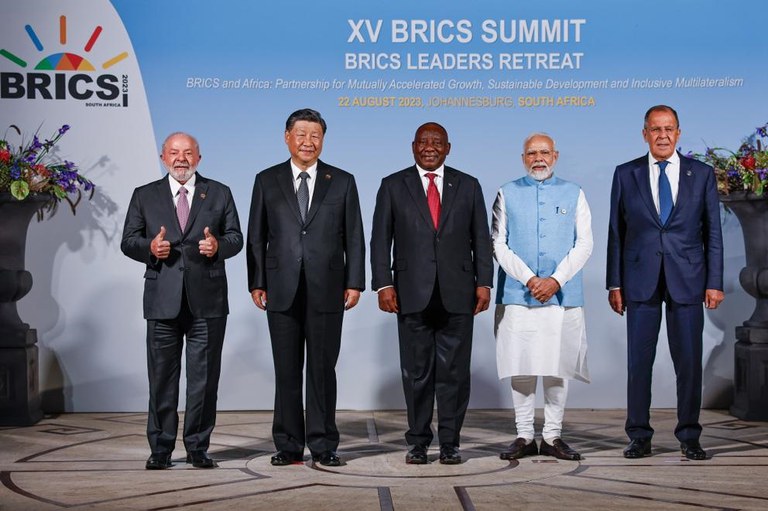
Brazil will host in July the BRICS+summit, a group that has completed 16 years since its first leader meeting, held in 2009. The new edition of the meeting takes place in a different geopolitical context from the one that originated the block, initially formed by Brazil, Russia, India, China and South Africa, and now expands with the adherence of new members and the request for entry by over 20 countries.
Created in the midst of the 2008 global financial crisis, BRICS came up with the proposal to reform international financial institutions, especially the International Monetary Fund (IMF), then criticized for the conduct of crisis responses. At that time, the bloc defended greater representativeness of developing countries in multilateral structures, without directly confronting existing organisms.
In recent years, however, the group has adopted a more geopolitical stance, especially after the deepening of tensions between China and the United States, conflicts involving Russia and the advancement of discussions about dollar alternatives as a reference currency. The entry of new members – including major oil exporters – and the expansion of the agenda beyond the economy strengthens the position of BRICS+ as a political coalition on the international scene.
Despite the change of focus, the bloc countries are still defending reforms in international financial architecture. One of the main points of the Brazilian Presidency Agenda will be the revision of IMF governance and quotas rules, with the objective of increasing the representation of Global Southern countries.
The bloc also proposes the reformulation of the institution’s loan policy, including the revision of the surcharges applied during crises and the definition of limits for interest on special withdrawal rights (SDRs).
The group also advocates the creation of an anticyclic model for the IMF surcharge system, allowing charges to be reduced in times of fiscal vulnerability rather than increased. Another front front will be the search for alternatives to the current model of the Common Framework From the G20 for restructuring sovereign debt, considered ineffective because it does not predict mechanisms of compulsory participation of private creditors or incorporate social or environmental criteria.
BRICS+ brings together countries with different economic profiles, including creditors such as China and debtors such as Egypt, Ethiopia and South Africa. Ethiopia, for example, has participated since 2021 debt treatment negotiations within the G20. For the bloc to strengthen its performance, leaders argue that China adopt concrete measures of debt relief from group countries, which could make investments in areas such as climate and social development possible.
One of the proposals discussed is the reform of debt sustainability analysis (DSA), currently conducted by international financial bodies. BRICS+ proposes that this analysis will incorporate long -term goals, such as adaptation to climate change, energy transition and social inclusion. Sustainability assessment would no longer be based exclusively on tax indicators and would consider the commitments made in multilateral agreements.
The Brazilian presidency should also prioritize the strengthening of the contingent reserve arrangement (ACR), created by BRICS to support countries with difficulties in the balance of payment. Brazil proposes that the portion of the IMF ACR resources – now limited to 30% – is expanded. Another proposal is to allow ACR loans to be granted in local currencies, reducing exposure to the dollar and the impacts of external indebtedness.
The group also advocates the inclusion of BRICS members’ currencies in the ACR reference basket, which would increase the fund’s operational flexibility and expand its relevance as an autonomous financial instrument.
In the Tax Agenda, the BRICS countries recognized the importance of the United Nations International Tax Cooperation (UNFCITC), formally established in 2024. The group considers the UN a more representative space than the Organization for Economic Cooperation (OECD), currently responsible for the leadership of tax base erosion negotiations and profit transfer (BEPs).
The “two pillars” agreement, formulated by the OECD, has been the target of criticism from developing countries, which argue that their needs are not contemplated. BRICS+ argues that UNFCITC becomes the new international tax standards negotiation forum, based on tax justice principles and equitable participation.
During the 2024 G20, the proposal to create a global tax on high heritage individuals was presented, as it will also be discussed under the BRICS+. Implementation will depend on the formation of an internal consensus in the block and the articulation with other global southern nations.
The proposals defended by Brazil also include the establishment of a new multilateral milestone of debt governance, which incorporates updated DSA parameters, transparency mechanisms – such as an international record of sovereign debt – and human rights commitments, gender equity and environmental safeguards.
The July meeting will take place under the leadership of the Brazilian presidency, which aims to reinforce the bloc’s internal coordination and consolidate strategic partnerships with developing countries. BRICS+ is expected to advance the construction of a new international financial architecture, focusing on equity between countries and the sustainability of global financing policies.
Source: https://www.ocafezinho.com/2025/06/28/brasil-recebe-cupula-do-brics-com-foco-em-reformas-no-fmi-divida-global-e-governanca-tributaria/

